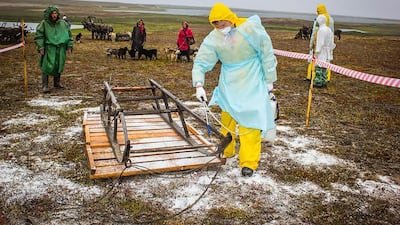Moscow // Anthrax, small pox and giant viruses – Russian scientists are warning of a host of threats that could be unleashed on the world as global warming melts the frozen far north of the country.
A recent anthrax outbreak on the Yamal peninsula left a child dead, 23 people infected and the government scrambling to deploy hundreds of rescue workers and soldiers to stop any further spread.
The most likely source of the epidemic was “burial sites for animals that died of anthrax 70 years ago”, according to Boris Kershengoltz, chief of research at the Russian Institute for Biological Problems of Permafrost Zone.
Grazing herds probably picked up the infection from these long-buried corpses of reindeer that were uncovered as the permafrost melted.
The fear now is that this was not a freak incident and that other diseases could be released – some dating back to the Ice Age – as global warming thaws Russia’s icy northern expanses.
“Can these processes repeat themselves? Of course they can,” Mr Kershengoltz said.
Russia is warming about 2.5 times more rapidly than the world average, and the Arctic region is warming quicker than the rest of the country.
Yamal, a peninsula straddling the northern Kara Sea and the Gulf of Ob, is sparsely populated by mostly indigenous nomadic reindeer herders. Temperatures in July were up to eight degrees higher than normal, reaching 34°C.
“Imagine Yamal, we are talking about a place above the Arctic Circle,” said Sergei Semenov, director of Russia’s Institute of Global Climate. “This is a colossal, unprecedented anomaly.”
Anthrax is spread by spores of the Bacillus anthracis bacteria which occurs naturally and can be ingested by livestock and passed to humans, usually through skin contact, causing black lesions. If left untreated it can be fatal.
Besides anthrax, there are plenty of other dangers lurking in shallow Arctic graves which might be unlocked from the ice after centuries, said Viktor Maleyev, deputy chief of Russia’s Central Research Institute of Epidemiology.
“We had smallpox graves” in the far north at the end of the 19th century, and scientists are discovering new “giant viruses” in mammoths, he said. “Their pathology has not been proven, we must continue to study them.”
“I think climate change will bring us many surprises,” he said. “I don’t want to scare anyone, but we should be ready.”
Mr Maleyev added that the anthrax crisis could have been avoided or lessened if reindeer, which were presumably infected by grazing over the anthrax graves, had been vaccinated en masse.
“Animals have to be vaccinated regularly,” he said.
Dmitry Kobylkin, governor of the Yamalo-Nenetsky region where more than 2,000 reindeer died, said vaccinations stopped about a decade ago, possibly after an erroneous decision that the region was safe from anthrax.
He said the total affected area in the region, together with an established buffer zone, was about 12,650 square kilometres.
“The process of disinfection will go on until soil analyses say that there is no anthrax in the area,” he said.
“It is unlikely that anything will grow there ever again.”
More than 1,500 people have been vaccinated, while 706 are receiving being treated with antibiotics, the regional government said on Wednesday. All residents are going through sanitation procedures and being moved to new areas.
Nearly 300 Russian troops are still working across the territory, burning the infected animal corpses at high temperatures, Mr Kobylkin said.
“There has never been anything like this in Russia,” he said of the disinfection operation. “Neither in terms of scope, nor in terms of complexity.”
“We never considered such a bacterial threat.”
Russian scientists say that instead of spending more money on studying the effects of climate change, science budgets are shrinking, and the government only allocates funds after emergencies and tragedies.
“There is less and less attention in our country to science, fewer grants for meteorology,” said Valery Malinin, an oceanologist from Russia’s Hydrometeorological Institute.
The government had come up with a climate programme in 2010 after deadly smog from peat fires gripped Moscow, only to forget about it. The program is now “effectively buried”, he said.
“When there are destructive phenomena we think it would be nice to have prevented them, but as soon as the passions die down, everything is forgotten.
“Yamal is just a small alarm bell,” he said. “Nature will continue to challenge us.”
* Agence France-Presse

